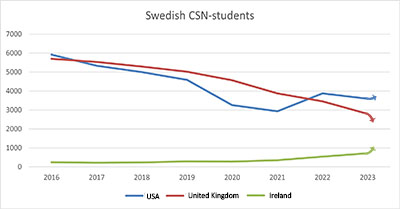How much does it cost to study abroad?
In this article we look at the different costs for studying abroad. We break down all the study abroad costs and look at examples from different countries.
I have helped students to study abroad since 2002. One of the most common questions is how much does it cost to study abroad? This question is almost impossible to reply without asking a number of follow up questions like:
- How long do you plan to study?
- Where will you study?
- What program will you take?
- Where do you plan to live?
A better question would be:
What are the costs when you study abroad?
As a study abroad student you will have the following costs:
- Tuition fee: in some countries you can study abroad for free but usually you have to pay for the tuition fee. It can often be your biggest expense when you study abroad, not least in the English speaking world.
- Other school fees: schools often charge application fees, facility fees, student union fees etc. However compared to the tuition fee these costs are small but they are still worth mentioning as they can easily be overlooked when you check the fees for your school.
- Course material: at universities and colleges you are usually responsible for getting your own course material. On a theoretical course this usually consists of course books that sometimes can be borrowed from the library or bought second hand. However for practical courses like design programs your material costs will be much higher if you have to buy the raw material used in your projects.
- Visa fees: with the exception of EU-students studying within EU you will most likely need a student visa and almost all countries charge a fee for visa applications. For example to get a F1-visa to the US currently costs 360 USD (application fee $160 plus Sevis fee $200) and a student visa to Australia currently costs 550 AUD.
- Insurance: it is very important to have a good insurance when you study abroad. We recommend Dr Walter's Protrip World insurance that costs €29.10 Euro/month for studies within Europe, €57.90 Euros/month for studies in USA or Canada and €39.30 Euros/month for the rest of the world.
- The trip to your place of study: travelling from one EU-country to another might only cost a couple of hundred Euros return trip but to fly to Australia from Europe will usually cost over €1000.
- Accommodation: student housing is one of your biggest costs when you study abroad. There is a big variation in prices depending on where you will study and what type of accommodation you choose. Big cities are usually more expensive than smaller places. Shared apartments and host families are almost always more cost effective than residences and studios. You can save money by sharing your room with one or more students.
- Food and travel costs: your accommodation will also influence your costs for food and travel. If you have access to a kitchen you can save money by cooking your own food, but in some countries eating in a cheap restaurant will not cost more than cooking at home. Living on campus can be expensive but you will save time and money on travelling and the restaurants on campus usually have student friendly prices.
- Entertainment, shopping and other costs: these living expenses will wary a lot depending on your habits. If you are bad with money it might be easier if you study in a smaller town where there are less temptations.
Student costs around the world
Some of the costs above arre the same if you study at home too but it is easy to spend more money when you study abroad unless you go to a cheap country. In Europe tuition fees are usually lower than in other parts of the world but living costs can be high. In many parts of Asia living costs are lower than in the Western World.
Here are some resources that can be helpful:
- Find out where you can study abroad for free
- See some quick examples of tuition fees around the world for non EU-citizens
- Check out our guide about scholarships for studying abroad as a way to lower your costs
















